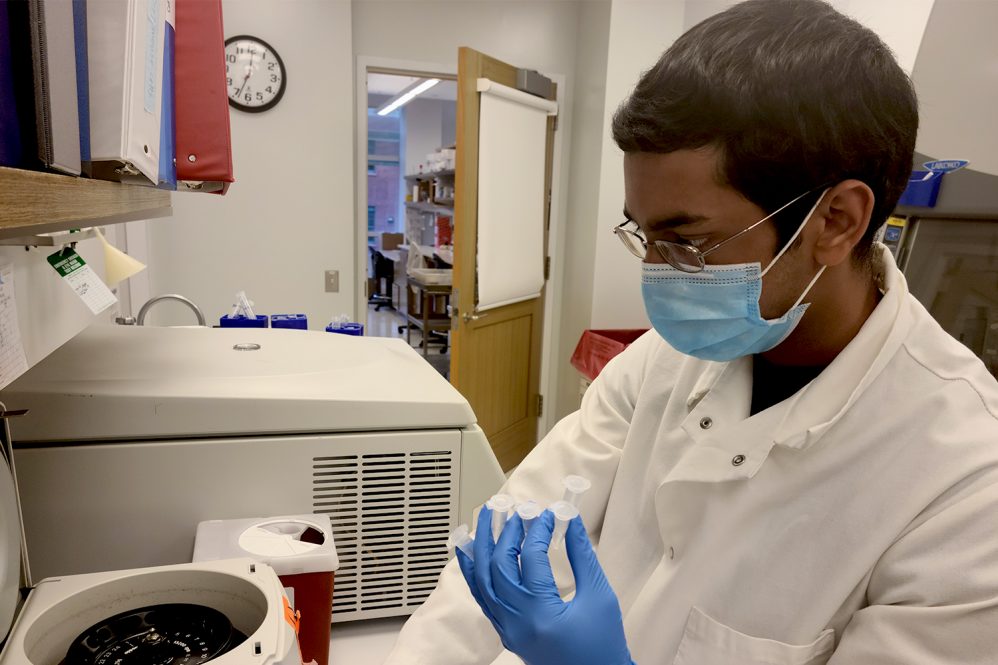UConn’s Office of Undergraduate Research each year provides Summer Undergraduate Research Fund (SURF) awards to support full-time undergraduate students in summer research or creative projects – an initiative that continues this year, despite the challenges presented by the COVID-19 pandemic.
SURF awards are available to students in all majors at all UConn campuses. A faculty committee representing various schools and colleges reviews the students’ project proposals, and SURF award recipients are chosen through a competitive process. Each SURF award winner is supervised by a UConn faculty member.
This summer, UConn Today once again takes a look at various SURF scholars and their work.
Name: Paul Isaac
Hometown: Storrs
Year: Rising Junior
Major: Molecular and cell biology & diagnostic and genetic science
Summer research project: Isaac is doing research on the genomic and cellular components of the horseshoe crab and their immune response with faculty mentor Rachel O’Neill, a professor in the Department of Molecular and Cell Biology.
Can you tell us about the research you are doing this summer?
My research project is around the North Atlantic horseshoe crab, and these crabs have a special protein in their blood that’s hypersensitive to specific type of bacterial endotoxin. The pharmaceutical industry bleeds these crabs for their blood and derives a sterility test that gets used for screening all kinds of needles and vaccines for contamination before they get used. As a result of these bleedings, the crab population has steadily decreased, and my research is interested in analyzing the genome in the cells of these crabs to see if, in the future, we can develop a synthetic version of these proteins so these crabs no longer need to be bled.
How did you get interested in this research?
It was a slightly winding journey. I came into this lab wanting to do a lot of bacterial microbial work and then along the way my mentor Dr. O’Neill, who is an amazing person, introduced me to the horseshoe crab project, since her lab was raising baby horseshoe crabs at the time. Once I did a little digging, I saw they had all these interesting biological characteristics. These horseshoe crabs date back 300 million years and they are closely related to trilobites, so they are ancient but they’ve remained practically unchanged. I’ve always been interested in weird genome stuff, which is what our lab specializes in. That is how I latched onto this project. I saw a good cause and I thought I might as well throw my hat in the ring.
How is research different from classroom work?
Research is a whole different kind of beast, because it gives you a chance to not only look at issues from a completely different perspective and really get your hands dirty, but also meet with tons and tons of people. Often your research is not just your lab, but through my SURF project I have done some collaboration with people at Sacred Heart University, and we’ve done our samples with people from other areas of UConn. It is super interdisciplinary.
When did you start doing research as a student?
I started right away because I got involved in the Holster Scholars Program for freshmen at UConn. That set me up for the SURF grant as this is a continuation of my Holster project, which got sidelined due to COVID and now I can actually do the real project that I suggested.
How did COVID affect your research?
Last summer, COVID forced me to do fairly computational work things I could do from home. I had data that my lab had collected in the past, but a lot of that was outdated and not as good as it could have been. I was able to do some basic statistical analysis and based on that analysis, I have been able to attack this project with new perspective and a lot of background knowledge going into it, which I would not have had the last summer. I feel like COVID derailed my path, but allowed me to jump back on with a lot more preparation than I would have had initially. So far it’s helped me be far more successful than I think I would have bene in the past.
What are your future plans?
I would like to go to medical school with genetic medicine as a specialty. I love the field of genetics and want to see its applications and help people with genetic disease.



